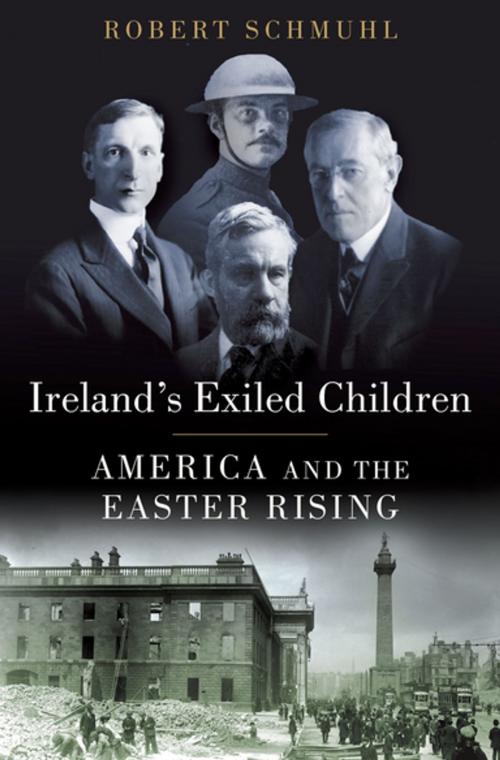Ireland's Exiled Children
America and the Easter Rising
Nonfiction, History, Ireland, Modern, 20th Century, Americas, United States| Author: | Robert Schmuhl | ISBN: | 9780190224301 |
| Publisher: | Oxford University Press | Publication: | March 8, 2016 |
| Imprint: | Oxford University Press | Language: | English |
| Author: | Robert Schmuhl |
| ISBN: | 9780190224301 |
| Publisher: | Oxford University Press |
| Publication: | March 8, 2016 |
| Imprint: | Oxford University Press |
| Language: | English |
In their long struggle for independence from British rule, Irish republicans had long looked west for help, and with reason. The Irish-American population in the United States was larger than the population of Ireland itself, and the bond between the two cultures was visceral. Irish exiles living in America provided financial support-and often much more than that-but also the inspiration of example, proof that a life independent of England was achievable. Yet the moment of crisis-"terrible beauty," as William Butler Yeats put it-came in the armed insurrection during Easter week 1916. Ireland's "exiled children in America" were acknowledged in the Proclamation announcing "the Provisional Government of the Irish Republic," a document which circulated in Dublin on the first day of the Rising. The United States was the only country singled out for offering Ireland help. Yet the moment of the uprising was one of war in Europe, and it was becoming clear that America would join in the alliance with France and Britain against Germany. For many Irish-Americans, the choice of loyalty to American policy or the Home Rule cause was deeply divisive. Based on original archival research, Ireland's Exiled Children brings into bold relief four key figures in the Irish-American connection at this fatal juncture: the unrepentant Fenian radical John Devoy, the driving force among the Irish exiles in America; the American poet and journalist Joyce Kilmer, whose writings on the Rising shaped public opinion and guided public sympathy; President Woodrow Wilson, descended from Ulster Protestants, whose antipathy to Irish independence matched that to British imperialism; and the only leader of the Rising not executed by the British-possibly because of his having been born in America--Éamon de Valera. Each in his way contributed to America's support of and response to the Rising, informing the larger narrative and broadly reflecting reactions to the event and its bitter aftermath. Engaging and absorbing, Schmuhl's book captures through these figures the complexities of American politics, Irish-Americanism, and Anglo-American relations in the war and post-war period, illuminating a key part of the story of the Rising and its hold on the imagination.
In their long struggle for independence from British rule, Irish republicans had long looked west for help, and with reason. The Irish-American population in the United States was larger than the population of Ireland itself, and the bond between the two cultures was visceral. Irish exiles living in America provided financial support-and often much more than that-but also the inspiration of example, proof that a life independent of England was achievable. Yet the moment of crisis-"terrible beauty," as William Butler Yeats put it-came in the armed insurrection during Easter week 1916. Ireland's "exiled children in America" were acknowledged in the Proclamation announcing "the Provisional Government of the Irish Republic," a document which circulated in Dublin on the first day of the Rising. The United States was the only country singled out for offering Ireland help. Yet the moment of the uprising was one of war in Europe, and it was becoming clear that America would join in the alliance with France and Britain against Germany. For many Irish-Americans, the choice of loyalty to American policy or the Home Rule cause was deeply divisive. Based on original archival research, Ireland's Exiled Children brings into bold relief four key figures in the Irish-American connection at this fatal juncture: the unrepentant Fenian radical John Devoy, the driving force among the Irish exiles in America; the American poet and journalist Joyce Kilmer, whose writings on the Rising shaped public opinion and guided public sympathy; President Woodrow Wilson, descended from Ulster Protestants, whose antipathy to Irish independence matched that to British imperialism; and the only leader of the Rising not executed by the British-possibly because of his having been born in America--Éamon de Valera. Each in his way contributed to America's support of and response to the Rising, informing the larger narrative and broadly reflecting reactions to the event and its bitter aftermath. Engaging and absorbing, Schmuhl's book captures through these figures the complexities of American politics, Irish-Americanism, and Anglo-American relations in the war and post-war period, illuminating a key part of the story of the Rising and its hold on the imagination.















